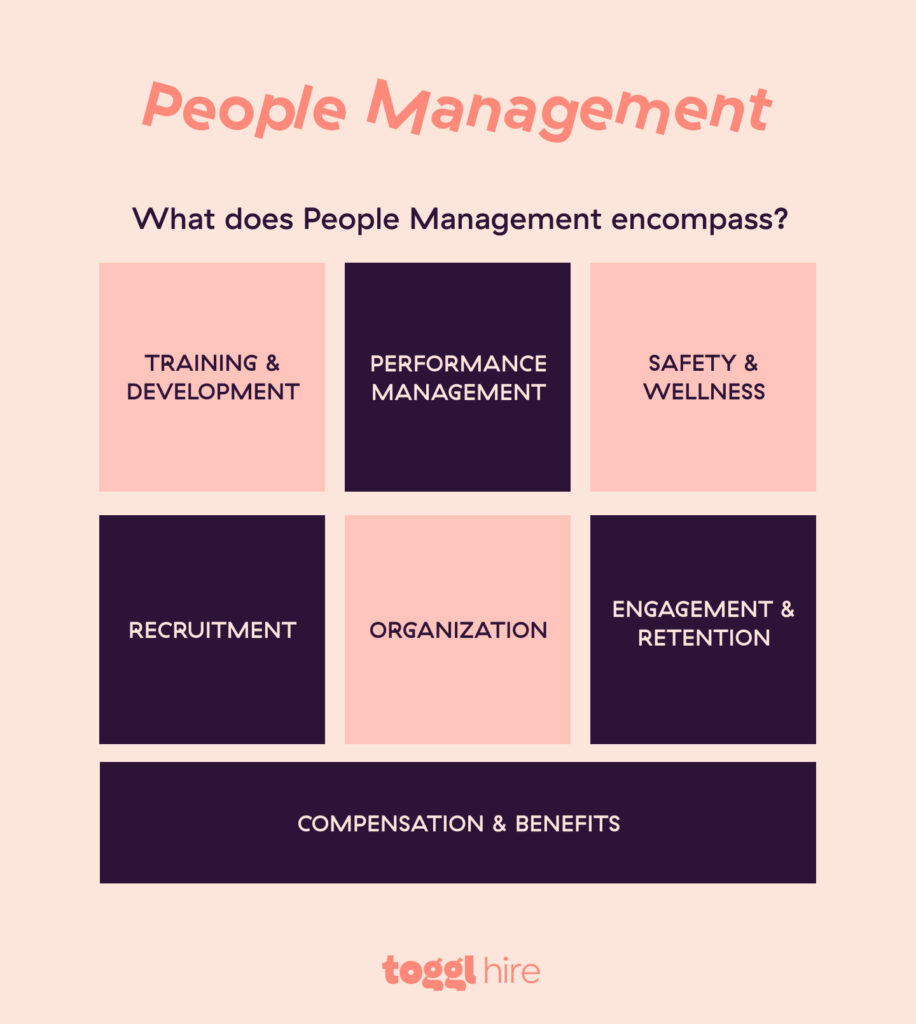According to a 2023 survey of nearly 7000 respondents, 41% of employees consider company leadership an important factor when choosing their next role.
Besides a competitive wage, work-life balance, and healthy company culture, you need leaders with great people management skills.
Today, we will explain everything you need to know about people management, how to identify candidates who excel at people management, and how to attract more of them to your talent pool.
TL;DR – Key Takeaways
- People management skills are soft skills that leaders need to have to effectively communicate, manage, and lead a team to maximize their productivity and employee satisfaction.
- A good people manager is easy to spot when looking at how they motivate their team, communicate effectively, how they lead and listen, take responsibility, and meet expectations and deadlines.
- Top people management skills include communication, empathy, conflict resolution, motivation, patience, persuasion, micromanagement, honesty, decision-making, problem-solving, time and task management, and accountability – and we go through them all in this article!
- To attract great people managers, you could try: highlighting the importance of people management skills in your job descriptions, offering compelling salaries and benefits as well as clear growth opportunities, hooking them with the latest tech tools, and, most importantly, giving them autonomy to make their own decisions.
- To hire the best people managers, try skills testing by Toggl Hire to assess and select candidates who excel at people management plus other hard skills needed to rock the job!

What are people management skills?
People management skills are the soft skills that leaders need to have to effectively manage and lead a team to achieve the best results at work. Examples of crucial people management skills include communication, decision-making, prioritization, conflict resolution, delegation, emotional intelligence, project management, and others.

Any manager – by nature of being human – will have a unique mix of skills and experience in regard to people management. For some, people management may come naturally, while more training and experience are required for others.
Before we take a look at what makes a good people manager, let’s take a quick look at a less-desirable example:
You’ve likely come across someone that lacks important people management skills at some point in your life. Despite having excellent hard skills, a lack of understanding and empathy with people can lead to a number of problems.
Among them, team burnout, running into frequent conflicts, struggles with team underperformance, and eventually, this type of leader can result in high employee turnover.
That’s just no good! Next, let’s see some of the qualities of a good people manager.
What makes a good people manager?
A good people manager is someone who instills confidence in their people, motivates them to do their best work, creates a positive work environment, fosters employee engagement and growth, takes responsibility (for both the good and the bad), and respects everyone’s time by meeting deadlines. In short, it’s someone who acts like the glue that keeps teams together and thriving.
A great leader knows how to maximize the potential of their team by encouraging everyone to do their best work – and not only to achieve but to surpass their targets.
Take Jason Fried, one of the co-founders of Basecamp, for example. There are many great posts to choose from, but you can see from this simple example how he thinks about his role as a leader.

As we said before, every manager with strong people management skills will have their own mix of skills, traits, and qualities that make up how they lead. But when you’re on the hunt for exceptional people managers, here are 12 of the most significant people management skills to look out for.
What are the most important people management skills? +12 examples
Besides being a professional in their line of work with extensive hard skills, every good people manager needs a wide range of soft skills to succeed in their role. Here are the top 12 that matter the most.
#1 – Communication skills
Effective communication involves active listening and being receptive to constructive feedback from employees. Great managers always have their ear to the ground and can resolve conflicts and boost employee performance just by communicating effectively and openly. They provide feedback but, at the same time, make their employees feel heard.
:max_bytes(150000):strip_icc():format(webp)/communication-skills-list-2063779_FINAL1-5b60d4a9c9e77c00251d3de9.png)
A whopping 86% of employees state that poor communication is the cause of failures in the workplace. This is a critical people management skill, allowing the manager to effectively communicate with their team and not just hand out orders.

#2 – Empathy
An empathetic leader puts their team members first and goes above and beyond to promote professional growth. They don’t simply aim to optimize workplace productivity by getting a higher output – they show genuine care and compassion for their team.
Empathetic leaders create better work environments. According to research, 76% of people who experienced empathy in the workplace reported being more engaged. Moreover, 61% of employees felt that they could be more innovative.
#3 – Conflict resolution
A good manager sees conflicts even before they arise and mediates between employees and departments to find peaceful, effective, and productive solutions.
85% of employees experience conflict in the workplace. This is not necessarily bad because conflict can lead to productive outcomes. However, you need good managers to stay on top of those conflicts before they escalate into counterproductive issues.
#4 – Motivation
A good manager knows how to motivate every team member and show them the value they provide to the team and the company. They can motivate employees to improve not just productivity but also employee satisfaction and engagement, as every team member can hope for better career development.
An astounding 39% of employees never feel appreciated at work. Without the feeling of appreciation, engagement goes down, leading to poor performance and employee turnover. This is an important people management skill to have if you want your employees to work for more than just a salary.
#5 – Patience
We live in a fast-paced world where results are expected instantly. Employees are constantly pressured to perform at a high level and be extremely productive. However, taking things slowly and having patience with employees is a critical skill that a good manager needs to succeed.
It’s a sign of maturity as a leader, and it instills calmness and strength in any work environment, especially with new employees. With a patient leader, team members can feel better about managing their workloads, and they won’t have to feel pressured by tight deadlines or unrealistic expectations.
#6 – Persuasion
A successful leader tells stories. Not only that but stories other people can believe in. Persuasion is tightly linked to motivation, and it’s best described in the workplace as the ability to sell the idea of something to your employees to make them truly believe in a cause rather than just putting in their 40 hours per week.
Persuasive leaders have the ability to get employees to believe in an idea bigger than crossing off items from a task list.
#7 – Macromanagement
Perhaps the worst management style is the opposite – micromanagement – going into employees’ everyday work schedules to the point where it becomes overbearing. Macromanagement is more about leading and managing from a distance.
It entails taking a step back and allowing the employees to solve problems and handle tasks on their own terms. It requires a strong belief in the manager’s whole team, as well as good communication and mutual respect.
| Micromanager Focus | Macromanager Focus |
|---|---|
| How: Micromanagers want to dictate how to accomplish a task. | What: Macromanagers are more concerned about the end product or delivery. |
| Directive: Micromanagers tend to give instructions and decrees. | Direction: Macromanagers tend to determine the destination or direction and let others figure out how to get there. |
| Procedures: Micromanagers concern themselves with regulations, processes, and other administrative issues. | Possibilities: Macromanagers focus instead on opportunities and create a compelling future vision. |
| Monitor: Micromanagers have mastered follow-up, ensuring that the commitments made have been delivered. | Mentor: Macromanagers focus their energy on helping others grow and develop to reach their potential. |
| Compliance: Micromanagers ensure that processes have been followed and results delivered. | Commitment: Macromanagers tap engagement and ensure a sustainable energy source, ideas, and deep connection to the organization’s mission. |
| Clearinghouse: Micromanagers serve as an orchestrator at the spoke of the wheel, accepting and funneling information where it’s required. | Collaboration: Macromanagers encourage networking and connections among a group or team members to ensure strong bonds and ongoing networking to serve the organization. |
#8 – Honesty
An amazing leader has no fear about being open and honest with their employees through thick and thin. They’re not afraid to take responsibility when they make mistakes and tell hard truths when the time comes.
Some might argue that this is a trait rather than a skill, but honesty can also be taught. Interestingly enough, a study by HBR showed that honesty decreases as you go down the management chain. The higher up you go, the more likely someone is to be honest.
#9 – Decision-making
On average, leaders spend about 37% of their time making decisions. Needless to say, they need to be good at it. This means having the analytical thinking skills to assess different situations and being able to make difficult decisions quickly.
If a leader is decisive, this means that they are confident, not only in their skills and judgment but also in their team.
:max_bytes(150000):strip_icc():format(webp)/decision-making-skills-with-examples-2063748-FINAL-5bad43d946e0fb002688e130.png)
#10 – Problem-solving skills
A great manager does not get scared in front of a difficult problem – they go and get the job done. They rise in front of new challenges, and through open communication, they encourage their employees to tackle the problem head-on.
Luckily, testing for problem-solving skills is quite easy with tools like Toggl Hire. Through scenarios and different situations, you can see who is naturally good at solving problems and coming up with different or creative ideas to tackle an issue.

#11 – Time and task management
Even though it may seem like a lot, 40 hours per week goes by very quickly if you’re not focused. Good leaders know the strengths and weaknesses of their teams. They know how to increase productivity by allocating employees and resources where it matters.
They have a high-level overview of everyone’s workloads without being pushy and micromanaging them. Most importantly, they are mindful of deadlines and budgets to avoid blowing through either of them.
#12 – Accountability
Great leaders are the first to take the blame onto their shoulders. They do not hide behind their teams and instead take the blame in the same way they would take credit for a job well done.
An astounding piece of research states that 80% of employees see accountability as punishment. In other words, when a leader is accountable, it usually means that they pass the blame for failed projects onto their people.
How to attract great people managers
Everyone wants a great people manager in their team, but how do you attract them to apply for your open roles? Before you go, here are some practical 9 tips for getting started.
Highlight people management skills in the job description
As all applicants have to read the job description, make sure that people management is highlighted as a must-have rather than a nice-to-have.
Work on your employer brand
Promote yourself as a company with great values and a strong culture. Stress how dedicated you are to employee development, which will not only attract great managers but show them that you care for your entire workforce.
🔥 Check out these tips on how to boost your employer branding.
Offer attractive salaries and benefits
Great managers are always in demand, and it takes more than job satisfaction to attract them. Stay on top of industry trends and salaries, and make sure you offer an attractive compensation package to entice them to apply.
Offer clear opportunities for growth
Give your potential managers an idea of what their growth path will look like immediately in the job ad. Show them what the next 6 months, one year, and 2 years will look like when they thrive in a role. Before they even join the company, they should know what to expect should they perform well in the job.
Give them autonomy to make their own decisions
A successful manager does not micromanage and does not like to be micromanaged, either. Show candidates that company leaders will not get in the way of how the managers’ work gets done – as long as it’s done properly.
Support diversity and inclusion
According to Monster’s research, 86% of candidates factor in a potential employer’s dedication to diversity, equity, and inclusion. To hire the very best leaders, highlight how you’re working towards making your workplace more inclusive and diverse.
Make good use of employee referrals
Create an employee referral program to motivate your current employees to refer someone amazing from their network. Not only will they refer someone they believe in, but they will also be awarded (hopefully) a nice bonus on their next paycheck.
Show your dedication to employee recognition
Throughout your online presence, showcase your employees’ successes and rewards for all team members, especially managers. Take a moment or two to jump on LinkedIn or Instagram to recognize your employees’ latest achievements and successes.
Show your commitment to using the latest tech and tools
Throughout the job ad, show the potential manager what exciting new technology they’ll get a chance to work with. This can include new project management tools, good communication tools, employee management tools and platforms, and others.
Hire a top people manager today using Toggl Hire skills tests
Testing your new manager for technical skills is easy, but it’s even easier to test them for management skills – if you have the right toolset.
With Toggl Hire, you can browse through a wide range of soft skills tests and choose the ones that you’re looking for in your next leader.
Sign up now to get started!
Juste loves investigating through writing. A copywriter by trade, she spent the last ten years in startups, telling stories and building marketing teams. She works at Toggl Hire and writes about how businesses can recruit really great people.





